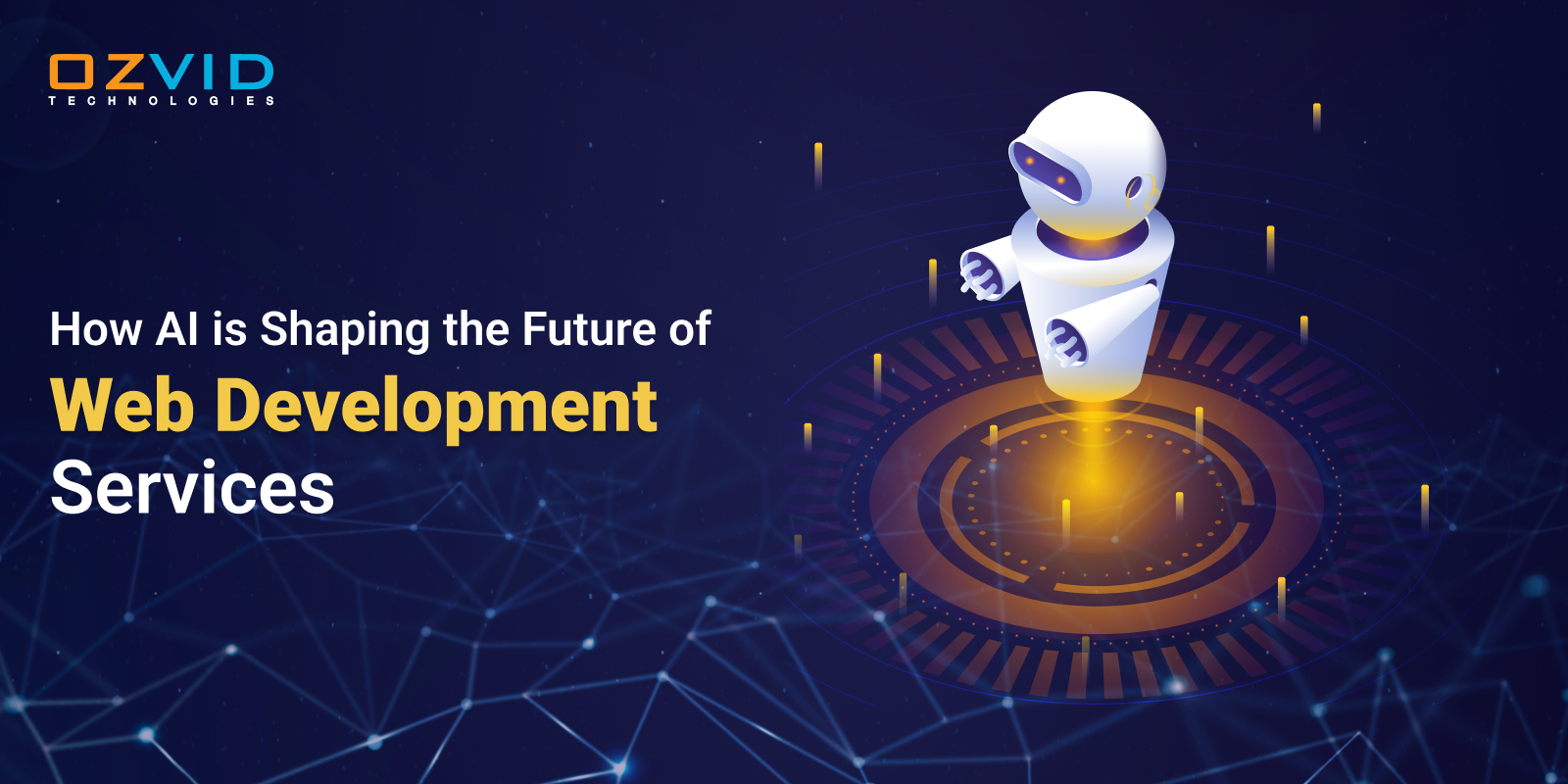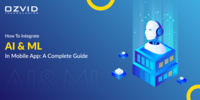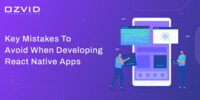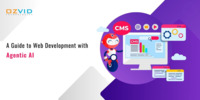- Jan 23, 2025
- Web Development
- 2892
Share this post on:

The rapid advancements in Artificial Intelligence (AI) are reshaping nearly every industry, and web development is no exception. As businesses strive to provide more dynamic, personalized, and efficient user experiences, AI has become an essential tool in transforming how websites and applications are built, maintained, and optimized. From automating routine tasks to creating smarter designs, AI is revolutionizing web development services in unprecedented ways.
In this blog post, we will explore how AI is shaping the future of web development services, covering the key areas where AI is making a significant impact and how businesses are leveraging this transformative technology to stay ahead of the curve.
Key Takeaways:
- AI automates web development tasks, improving efficiency.
- Personalizes user experiences through tailored recommendations.
- Enhances SEO, security, and website performance.
- Streamlines content creation, code generation, and debugging.
- Revolutionizes web design with AI-powered tools.
The Role of AI in Web Development
AI encompasses a range of technologies, including machine learning, natural language processing (NLP), neural networks, and deep learning, which enable machines to perform tasks that traditionally required human intelligence. When applied to web development, AI can automate tasks, enhance user experiences, improve website performance, and even help developers write better code.
Here are some key ways AI is making waves in web development:
1. Personalization of User Experience
User experience (UX) is one of the most crucial aspects of web development. Websites and applications that are intuitive, engaging, and responsive tend to attract and retain users better. AI is revolutionizing UX design by allowing websites to become more personalized and adaptive to individual user needs.
AI-powered recommendation systems are a perfect example of this. By analyzing a user's browsing history, preferences, and behaviour, AI can predict what content or products a user is most likely to engage with next. This results in highly personalized recommendations, increasing the likelihood of user interaction and conversion.
2. Chatbots and Virtual Assistants
One of the most visible AI-driven features in web development is the implementation of chatbots and virtual assistants. These tools use natural language processing (NLP) and machine learning to engage with users in real-time, providing assistance, answering questions, and offering support. AI-powered chatbots are a significant improvement over traditional customer service. They can handle multiple queries simultaneously, provide instant responses, and operate around the clock without the need for human intervention. By analyzing user queries and learning from past interactions, chatbots can continuously improve their responses, offering increasingly accurate and relevant support.
Moreover, AI can assist developers in creating more intuitive and human-like conversational interfaces. The integration of NLP enables chatbots to understand not only simple commands but also complex queries, making them a valuable addition to any website.
3. Automated Web Design
Web design can be a time-consuming and complex process, requiring creativity, technical skills, and attention to detail. However, AI web app development services are making it easier for developers to design websites by automating various aspects of the design process.
AI-powered website builders such as Wix ADI (Artificial Design Intelligence) and Bookmark’s AiDA use machine learning algorithms to create websites based on user preferences and inputs. These tools ask users questions about their design preferences, such as the type of website they want to build, their industry, and the desired functionality. Based on this information, the AI generates a fully functional and customized website layout in a matter of minutes.
In addition to simplifying the design process, AI can also optimize websites for mobile devices, ensuring a seamless experience across all screen sizes. With the growing importance of responsive design, AI-driven tools can automatically adjust layouts and elements for optimal mobile performance.
4. Code Generation and Debugging
One of the most time-consuming tasks for developers is writing and debugging code. With the help of AI, web app developers can streamline these processes, reducing errors and increasing efficiency.
AI tools such as GitHub Copilot, powered by OpenAI, assist developers by offering code suggestions, auto-completing lines of code, and helping to find solutions to common coding problems. This allows developers to focus on more complex tasks while reducing the time spent on routine coding and troubleshooting.
AI-powered code analyzers can also help identify potential issues and vulnerabilities in the code, providing suggestions for improvement before the code is deployed. This can drastically reduce the number of bugs and security flaws in the final product.
5. Improved Search Engine Optimization (SEO)
SEO is a critical aspect of web app development, ensuring that websites rank well on search engines like Google and attract organic traffic. AI is playing a central role in transforming how SEO is implemented by analyzing user behavior, search patterns, and ranking factors more effectively than traditional methods.
AI algorithms can now predict search intent by analyzing user queries, identifying related keywords, and providing recommendations for optimizing content. Tools like SEMrush and Moz use machine learning to analyze the vast amount of data generated by search engines, helping businesses optimize their websites for better visibility.
Additionally, AI can optimize content for readability, keyword density, and relevance, ensuring that websites are not only user-friendly but also search-engine-friendly. This helps businesses improve their search rankings and attract more traffic without relying solely on manual SEO efforts.
6. AI-Powered Testing and Quality Assurance
Ensuring the quality and performance of a website is a crucial part of the development process. AI is now playing a significant role in automating website testing and quality assurance, making it faster and more efficient.
AI-powered testing tools can simulate user behavior, detecting bugs, performance issues, and security vulnerabilities in real time. By using machine learning to analyze vast datasets, these tools can identify patterns that might be missed by traditional manual testing methods. This allows developers to fix issues proactively, reducing the risk of errors after launch.
Furthermore, AI can continuously monitor websites for performance issues, identifying areas where improvements can be made to enhance the overall user experience.
7. Enhanced Website Security
With the increasing number of cyber threats and security breaches, protecting user data and ensuring a website’s security is more important than ever. AI is helping web developers strengthen website security by detecting potential threats and responding to them faster than traditional security measures. AI-driven security tools can monitor websites in real-time, analyzing patterns of user behavior to identify suspicious activity. These tools can also detect malware, phishing attempts, and other security vulnerabilities, alerting developers to potential issues before they escalate.
In addition, AI can assist in strengthening password security by recommending stronger password policies and utilizing machine learning to detect anomalies in user login patterns, such as unusual login times or locations.
8. AI for Content Creation
Content is the lifeblood of many websites, and AI is increasingly being used to automate and enhance the content creation process. AI-powered tools like OpenAI’s GPT-3 and Jasper can generate high-quality written content based on specific keywords or topics, saving time for content creators and marketers.
These tools are capable of generating blog posts, product descriptions, social media captions, and more, with minimal human input. This is especially useful for websites that require frequent content updates, such as news outlets or e-commerce platforms.
AI can also assist in enhancing existing content by providing recommendations for improvement, such as keyword optimization or grammar correction.
9. Optimizing Website Performance with AI
Website performance is a critical factor in user experience and SEO. Slow-loading websites can lead to high bounce rates and decreased conversions. AI tools are now being used to optimize website performance by analyzing user behavior, page loading speeds, and server performance to provide recommendations for improvement.
For example, AI can optimize image sizes, compress files, and suggest changes to website architecture that improve loading times. Additionally, AI can predict traffic spikes, automatically adjusting server resources to handle increased demand without compromising performance.
Conclusion: The Future of Web Development Services
AI is undoubtedly shaping the future of web development, and its impact will continue to grow as technology evolves. By automating routine tasks, personalizing user experiences, improving performance, and enhancing security, AI is transforming the way websites are created, optimized, and maintained.
As businesses look for ways to stay competitive in a fast-changing digital landscape, partnering with AI-driven web development service providers will be essential. OZVID Technologies, a leading AI-driven web development company, is dedicated to helping businesses harness the power of AI to build innovative, efficient, and scalable websites. With expertise in AI, machine learning, and web development, OZVID Technologies ensures that their clients stay ahead of the curve in a technology-driven world.
If you are looking to embrace the future of web development, OZVID Technologies is your ideal partner, bringing the latest AI technologies to deliver high-quality, intelligent, and user-friendly web experiences. As the digital world continues to evolve, AI will remain a key player in shaping how businesses and consumers interact online. Get in touch with us today and leverage our expertise.
FAQs
How is AI changing web development?
AI helps web developers create smarter websites by automating tasks, improving user experience, and personalizing content. It can also help with coding, testing, and optimizing site performance.
What role does AI play in improving website design?
AI can suggest design elements, layouts, and color schemes based on user preferences and trends. It helps create more attractive and functional designs without needing much manual effort.
Can AI help in website performance optimization?
Yes, AI tools analyze website traffic and user behavior to identify slow areas. They can then suggest or make changes to improve load times and overall site performance.
How does AI improve user experience on websites?
AI can personalize content and recommendations, making websites more relevant to each user. It can also provide chatbots for instant help and adjust site elements based on user interactions.










